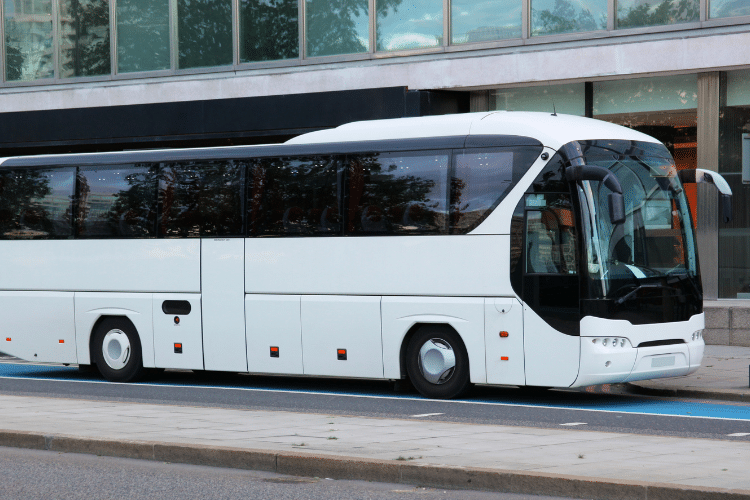Last Updated on October 11, 2024 by Maryam Siddiqui
The Algarve’s stunning coastline and vibrant cities are waiting to be explored! Whether you’re an expat, a tourist, or a local who’s here for a staycation, you’ll want to know your way through the coastal towns. And what better way to get around than by hopping on public transport in the Algarve?

From buses, trains, ferries, and taxis, the Algarve offers a variety of affordable and convenient options to help you make the most of your time. The numerous cities will keep you wanting to explore more and more.
But what’s the best mode of travel? Are there any discount cards for frequent travelers? Should office-going expats even rely on public transportation at all? Continue reading this article to familiarize yourself with public transport in the Algarve!
Is public transport in the Algarve good?
As an expat, you might be concerned about whether the services are up to standard. Maybe you’ve got a flight to catch from Faro Airport or just landed there and want to know your way to the city center.
Well, the good news is that getting around the region by bus or train is generally reliable and affordable. The bus system, in particular, is well-established and covers most major towns.
This makes exploring the Algarve’s beaches, historical sites, and picturesque villages easy. However, do remember that buses can get crowded during peak tourist season, so plan accordingly.
Algarve’s train network runs along the coast and offers stunning views of the Atlantic Ocean and the rugged coastline. Plus, trains have air-conditioning, making them a comfortable way to travel during the hot summer months.
Overall, while the public transport in the Algarve might not be as extensive as in larger cities like Lisbon, it is certainly good enough to help you get where you need to go.
How are the buses in the Algarve?
The Algarve bus has a range of routes that connect towns, cities, and tourist attractions. These run from early morning until late at night, with many services operating every half-hour during peak times. Their timetables are readily available online and at the bus station, so planning your journey is easy.
The cost varies depending on the distance traveled but usually ranges from €1.50 to €5.00. Discounted tickets and passes are also available for frequent travelers to make it more affordable to travel around the region.
For expats in the Algarve, the bus network is a great way to explore the region and connect with local communities. Due to being cost-effective, comfortable, and air-conditioned, buses are also suitable for routine workplace travel.
The Faro bus station is one of the most used bus stations in the Algarve, located near Avenida da República. A direct bus from the city center to the Faro airport terminal leads every hour from 5 am to midnight. If you’ll be using this service, be sure to factor in some extra time, on top of the 20 minutes it usually takes.

- Read Also: Public Transport In Porto: All You Need To Know.
How are the trains in the Algarve?
Similar to buses, trains are generally a convenient and affordable way to get around the region. However, the Algarve train is usually preferred for larger distances. Currently, there is no train line connection to the Faro airport.
The main train stations connect Lagos in the west to Vila Real de Santo António in the east, with stops at popular destinations such as Portimão, Albufeira, and Faro so you can enjoy the journey.
Trains in the Algarve are modern, air-conditioned, and offer comfortable seating. There are several daily departures, but their intervals vary according to the seasons. You’ll be glad to know ticket prices are relatively low, with fares starting at an average of €1.84 for a single journey. You can buy tickets from the train station or online.
How are the ferries in the Algarve?
These are fantastic ways to explore the region’s stunning coastline and nearby islands. You will find the experience engaging and memorable, with beautiful views and a chance to see some of the local marine life.
Generally, boat tours are reasonably priced, and there are often discounts for children and seniors.
There are several ferry operators, and the prices and times vary based on the route and season. Unlike buses and trains, ferry schedules vary more frequently, so you must check the timetables before you plan your trip.
Some of the most popular ferry routes include trips to the stunning Benagil Cave, the idyllic Ilha Deserta, and the charming town of Portimão. Taking boat tours is an excellent way to experience the Algarve’s beauty and its unique experiences.
What are the public transport prices?
A single ticket for a bus within one zone costs around €1.50, while a day ticket (valid for multiple trips) costs around €4. Also, a 3-day pass costs €12.00, and a 7-day pass costs around €22.00. The bus from Faro’s city center to Faro Airport costs €2.70.
For trains, the price depends on the destination and the class of travel. For example, a one-way ticket from Faro to Lagos in 2nd class costs around €7.50, while a 1st class ticket costs around €11.
Taxis are available throughout the Algarve, and their fares are regulated by law. The price per kilometer usually starts at €0.47.
EVA Transportes, which operates the bus and train system in the Algarve, offers a rechargeable smart card called “Passe 7 Dias” (7-Day Pass). This card allows for unlimited travel on buses and trains for a period of seven days and typically ranges from €15 to 40 euros.
Where does public transport in the Algarve fall short?
While major cities such as Lagos, Albufeira, Faro, and Portimão have established transportation systems with accessible buses and trains, other areas have limited options, such as infrequent buses or unreliable schedules.
Another issue is the lack of coordination and integration between different modes of transportation. This results in confusion on stops, long waiting times, and sometimes inconvenient travel routes.
Also, note that the pricing system can be confusing. This is so as different prices and payment methods exist for each mode of transportation, with little clarity provided on each.
Although the region’s transport has improved in recent years, it still falls short in some areas. For example, differently-abled individuals may need to plan their routes and explore alternative transportation options such as private services or car rentals.
Let’s Move to Europe
With Viv Europe your plans for Europe will come to a reality
Is public transport in the Algarve accessible for the differently-abled?
Well, this is not a hundred percent given. However, some still offer this facility.
Major cities such as Faro and Portimão have wheelchair-accessible buses and trains, but smaller towns and rural areas may not have the same level of accessibility. We recommend that you plan and check with the specific transportation company regarding their accessibility policies and accommodations.
Do note that some expats in the Algarve choose private transportation services or rent their vehicles for increased mobility and convenience. But this is entirely up to you as apart from a few limitations; there are still options available for differently-abled individuals to navigate the Algarve with proper planning and research.

Other options for getting around the Algarve besides public transport
As an expat, there are many options available for getting around the Algarve besides public transportation. A rental car or scooter is a popular choice among expats, as it allows more freedom and flexibility in making your schedule.
Bicycles are another great option for traveling. Many companies offer bike rentals and guided tours for those who prefer a more leisurely pace. And there are plenty of walking trails, hiking routes to discover, and boat tours that you’ll love!
Check out some options below.
Transport apps and taxis in the Algarve
Apps such as Uber, Bolt, and 1Taxi offer a reliable and affordable way to travel around the area. These are especially useful if you want to avoid the hassle of negotiating with taxi drivers.
However, taxis are generally safer and are also comfortable. It’s important to note that taxi fares can vary depending on the peak hour and the distance. For this reason, agreeing on the fare before you start your journey is advisable to avoid any unpleasant surprises. Also remember that taxis and car-hailing services only accommodate up to four passengers usually.
Buying a car in the Algarve
This is a great option if you plan to stay in the region for an extended period. One of the first steps you should take to purchase a car is to obtain a Portuguese tax number and open a local bank account. Registration, insurance, and road tax are the necessary documents and fees for buying.
Several car dealerships in the Algarve allow expats to look for a car that meets their needs and budget. You can also browse online platforms like OLX Carros and Standvirtual to find a suitable vehicle. Remember that before you buy a car in Portugal, it’s essential to have it inspected by a trusted mechanic to ensure it’s in good condition.
You can also explore using car rental companies to rent cars to travel as a family and discover hidden beaches.
Renting a bike or electric scooter
This is a great way to explore the Algarve, especially for expats looking for an affordable and eco-friendly mode of transportation. You can rent bikes and electric scooters almost everywhere, including in Faro, Lagos, and Albufeira.
In Faro, you can rent a bike for around €15 per day, while electric scooters cost around €25 per day. In Lagos, the rate starts at €10 per day for bikes and €20 per day for electric scooters.
Companies including FreeRideAlgarve, ScooterRentAlgarve, and MyBikeAlgarve are known for such rentals. A definite pro is that these offer various options, including daily, weekly, and monthly rentals, making it convenient for expats to choose the best option that suits their needs.
More information and some advice
In case you were wondering if this is all the information, here are some additional tips! Although taxis are widely available, these can be more expensive than other modes of transport.
Several rental car companies operate in the Algarve if you prefer to drive yourself, don’t have a car yet, or are on a scouting trip. A rental car can also be a great way to travel around the region at your own pace, but it’s important to be aware of the local driving laws and customs.
If you do choose to drive, it’s important to note that in Portugal, drivers drive on the right-hand side of the road. Speed limits are also strictly enforced, and it’s essential to have a valid driver’s license and appropriate insurance.
The regional train service is known as the “CP” and connects the Algarve with other major cities in Portugal. Also, several different companies operate buses, and services can vary in frequency and reliability depending on the route.
Is it worth relying only on public transport?
This question depends entirely on your needs. There are a lot of places that are easy to access simply via public transportation or walking.
Some people who are here to visit don’t even require a car to explore the region. But some do. If you’re interested in exploring a few rural parts of Portugal, it’s best to have a rental car or a car of your own.
Until there’s a new metro system with reliable timings, we’d recommend trying out the public system and seeing what works for your schedule. Who knows, it might work out perfectly for you.
That’s it; you’re ready to move around! This guide concludes everything you need to know. If you have any questions, join our Facebook Group – All About Portugal For Expats, and connect with expats there.
Before we say goodbye, you should know that Viv Europe can bring your car all the way to Portugal for you! Scratch out the idea of buying a new one, and let us handle that hassle for you. Book a consultation with our experts to discuss your case before making the big move!





